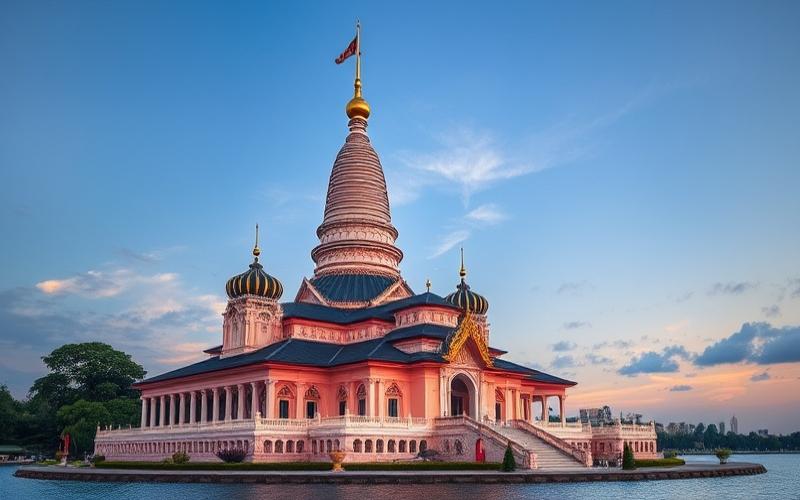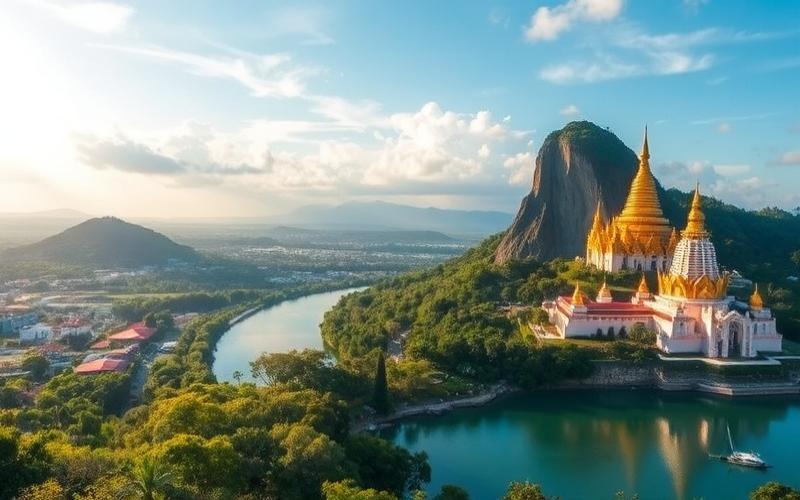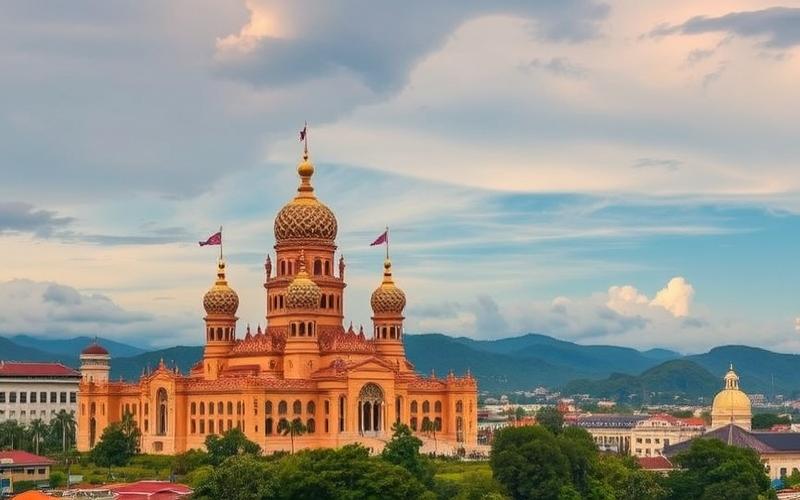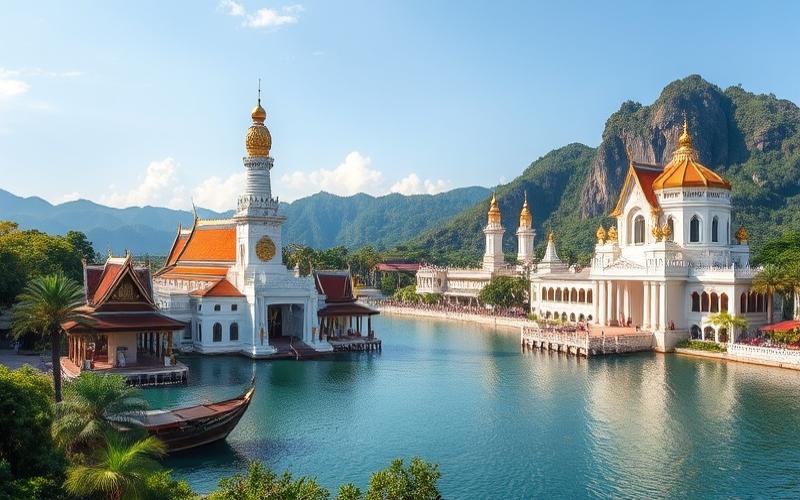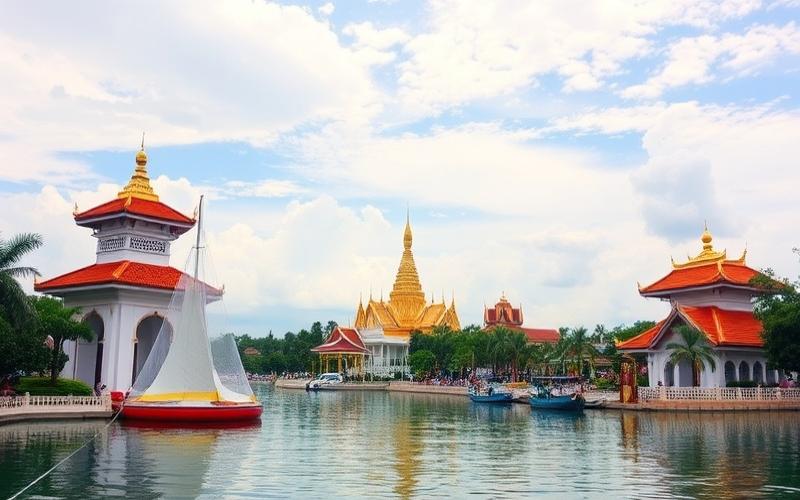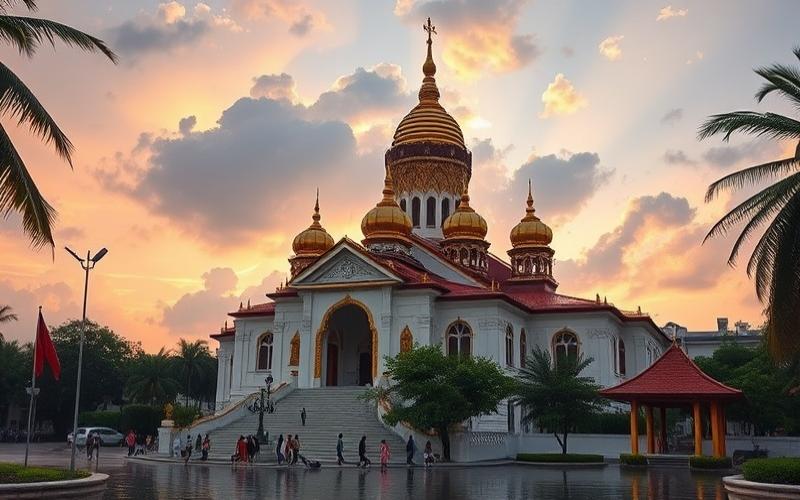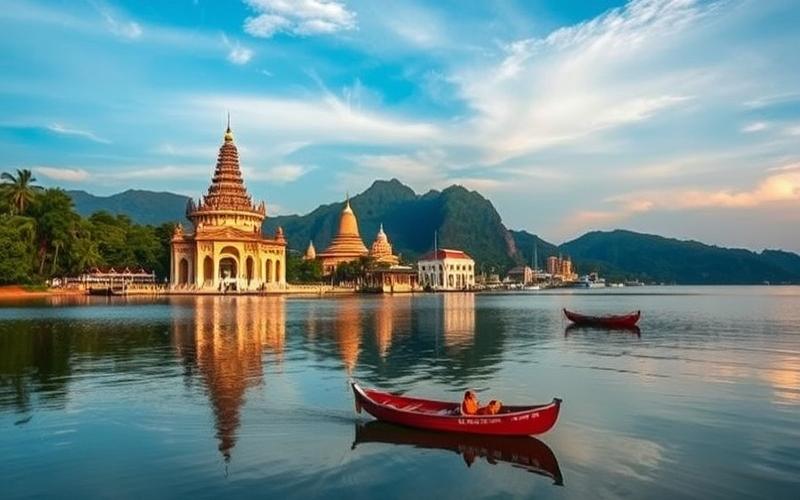
 Published on and written by Cyril Jarnias
Published on and written by Cyril Jarnias
Brunei, a small sultanate located on the island of Borneo, is attracting more and more foreign investors thanks to its economic and political stability. If you’re considering purchasing property in this country, it’s essential to understand the specifics of local real estate financing. This article will guide you through the various steps and conditions for obtaining a home loan in Brunei, whether you’re a resident or a foreigner.
Doors Opening: Financing Opportunities for Foreigners
Contrary to some common misconceptions, foreigners can indeed obtain real estate financing in Brunei. However, it’s important to note that the conditions and processes may differ from those applied to Bruneian citizens.
The Brunei government has implemented policies aimed at attracting foreign investment in the real estate sector. These policies have led to a gradual opening of the real estate financing market to non-residents. However, it should be noted that certain restrictions remain, particularly regarding the types of properties accessible to foreigners.
Local and international banks present in Brunei offer real estate financing products tailored to the needs of foreign investors. Among the most active institutions in this field are Baiduri Bank, Bank Islam Brunei Darussalam (BIBD), and Standard Chartered Bank.
These financial institutions have developed specific offers for non-residents, with competitive interest rates and flexible repayment terms. However, it’s important to note that loan approval conditions for foreigners may be stricter than those applied to local residents.
Foreign investors typically need to provide a higher down payment, often between 30% and 50% of the property value. Additionally, the interest rates offered may be slightly higher than those offered to Bruneian citizens, to compensate for the perceived higher risk by banks.
It’s also crucial to understand that certain areas or property types may be subject to restrictions for foreign buyers. For example, the purchase of undeveloped land is generally reserved for Bruneian citizens. Foreigners are mainly allowed to acquire apartments, condominiums, or houses in designated residential areas.
Good to know:
Although foreigners can obtain real estate financing in Brunei, they should expect stricter conditions, including a higher down payment and potentially higher interest rates. It’s recommended to consult several banks to compare offers and find the most advantageous solution.
The Winning Application: Essential Documents for Your Loan Request
To maximize your chances of obtaining real estate financing in Brunei as a foreigner, it’s crucial to prepare a strong and complete application. Here’s a list of documents generally required by Bruneian financial institutions:
- Valid passport and residence visa (if applicable)
- Proof of identity (home country ID card, international driver’s license)
- Bank statements from the last 6 months
- Proof of income (pay stubs, tax returns)
- Employment contract or proof of stable employment
- Employer certification (for employees)
- Financial statements from the last 3 years (for self-employed individuals or entrepreneurs)
- Proof of assets (savings account statements, investment portfolios)
- Details of real estate properties already owned (if applicable)
- Information about the property to be financed (sales agreement, property appraisal)
- Detailed financing plan
It’s important to note that all documents must be provided in English or Malay, the two official languages of Brunei. If your documents are in another language, you’ll need to have them translated by a certified translator.
Additionally, some banks may require additional documents depending on your personal or professional situation. Therefore, it’s recommended to contact financial institutions directly to obtain a comprehensive list of required documents.
The quality and completeness of your application will play a crucial role in the evaluation of your loan request. The more complete and well-presented your application is, the better your chances of obtaining a favorable response and advantageous conditions.
Don’t hesitate to seek help from a local financial advisor or experienced real estate agent to help you prepare your application. Their knowledge of the Bruneian market and the specific requirements of local banks can prove invaluable in optimizing your chances of success.
Good to know:
Careful preparation of your loan application is essential. Make sure all your documents are up to date, translated if necessary, and presented professionally. A well-prepared application can make the difference between acceptance and rejection of your financing request.
Keys to Success: Essential Conditions for Securing Your Loan
Obtaining real estate financing in Brunei as a foreigner requires meeting certain specific conditions. Here are the main criteria that Bruneian banks consider when evaluating your loan application:
1. Financial and Professional Stability
Banks place great importance on your employment situation and the stability of your income. Generally, you’ll need to demonstrate stable employment for at least two years, preferably with a permanent contract. For self-employed individuals or entrepreneurs, you’ll need to demonstrate the viability and profitability of your business over several years.
Your income must be sufficient to cover the loan installments while maintaining a comfortable standard of living. Most Bruneian banks apply a maximum debt ratio, typically set between 60% and 70% of your monthly income.
2. Substantial Down Payment
As mentioned earlier, banks generally require a higher down payment from foreign borrowers. You’ll need to be able to provide between 30% and 50% of the purchase price of the property, depending on your profile and the bank’s policy.
This significant down payment serves as additional security for the bank and demonstrates your financial commitment to the project. The higher your down payment, the better your chances of obtaining favorable loan conditions.
3. Impeccable Credit History
Although Brunei doesn’t have a centralized credit scoring system like some Western countries, banks will carefully examine your financial history. You’ll need to prove your ability to manage your finances responsibly, particularly by demonstrating a history of timely repayment of previous loans or bills.
If you’ve previously taken out loans in other countries, it may be helpful to provide certificates of good financial conduct from your previous creditors.
4. Age and Loan Term
The borrower’s age is also considered in the evaluation of the loan application. Most Bruneian banks set a maximum age limit at the end of the loan, typically around 65 years. This means that if you’re 50 years old, you might be limited to a maximum loan term of 15 years.
The loan term directly influences the amount of the installments and therefore your repayment capacity. Banks generally offer terms ranging from 5 to 30 years, but the maximum term may be adjusted based on your age and employment situation.
5. Type and Value of the Property
The type of property you wish to acquire and its value also play an important role in the evaluation of your loan application. Bruneian banks generally prefer residential properties located in well-established urban or tourist areas.
The property value must be appropriate for your financial capacity. Banks will conduct an independent appraisal of the property to ensure that its price corresponds to its real market value.
6. Insurance and Guarantees
To secure the loan, banks generally require the subscription of life insurance and home insurance. These insurances protect both the borrower and the bank in case of unforeseen events such as the borrower’s death or damage to the property.
Additionally, the property itself will serve as the main guarantee for the loan. In case of payment default, the bank could seize the property to recover its debt.
Good to know:
Meeting all these conditions might seem intimidating, but they’re essential to guarantee the stability of the Bruneian real estate market and protect both borrowers and lenders. Careful preparation and responsible financial management are the keys to meeting these requirements and obtaining the desired financing.
An important particularity of the Bruneian financial system is the significant presence of Islamic finance. As a Muslim country, Brunei has developed a Sharia-compliant banking sector that coexists with the conventional banking system. This duality offers foreign investors a unique opportunity to explore alternative financing options.
Principles of Islamic Finance
Islamic finance is based on ethical and moral principles derived from Islamic law (Sharia). The main characteristics include:
- Prohibition of interest (riba)
- Sharing of risks and profits
- Investment in real and productive economic activities
- Prohibition of speculation and excessive uncertainty (gharar)
Islamic Real Estate Financing Products
Islamic banks in Brunei offer several Sharia-compliant real estate financing products, the most common of which are:
1. Ijara (Leasing): The bank purchases the property and leases it to the borrower for a specified period. At the end of this period, ownership is transferred to the borrower.
2. Musharaka Mutanaqisa (Diminishing Partnership): The bank and the borrower jointly purchase the property. The borrower gradually buys out the bank’s share while paying rent for the use of the portion they don’t yet own.
3. Murabaha (Cost-Plus Sale): The bank purchases the property and resells it to the borrower at a marked-up price, payable in installments.
These products can offer interesting advantages for foreign investors, including greater flexibility in financing structure and sometimes more competitive overall costs.
Considerations for Foreign Investors
If you’re considering opting for Islamic financing in Brunei, here are some points to consider:
1. Understanding the Products: Make sure you fully understand the specifics of each Islamic financing product. Don’t hesitate to ask for detailed explanations from bank advisors.
2. Comparison with Conventional Options: Carefully compare the total costs and conditions of Islamic products with those of conventional loans to determine the most advantageous solution for your situation.
3. Tax Implications: Consult a tax expert to understand the potential implications of Islamic financing on your tax situation, both in Brunei and in your home country.
4. Regulatory Compliance: Ensure that the chosen Islamic financing product complies with Bruneian regulations regarding foreign investment.
Good to know:
Islamic financing can offer interesting alternatives to conventional loans for foreign investors in Brunei. However, it’s crucial to fully understand the specifics of these products and carefully compare all available options before making a decision.
Winning Strategies to Optimize Your Loan Application
To maximize your chances of obtaining advantageous real estate financing in Brunei as a foreigner, here are some strategies to implement:
1. Build a Local Presence
Establishing a presence in Brunei before applying for a loan can greatly improve your credibility with local banks. Consider opening a local bank account and maintaining a comfortable balance for several months. This will demonstrate your commitment to the country and facilitate future transactions.
2. Cultivate Banking Relationships
Don’t just submit a loan application. Take the time to meet with bank advisors, explain your project and your financial situation. Strong personal relationships can make a difference in the evaluation of your application.
3. Choose an Attractive Property
Choose a property in a sought-after area with strong growth potential. Banks will be more inclined to finance a project they consider a safe investment.
4. Prepare a Solid Business Plan
If you plan to use the property for commercial purposes (rental, professional activity), prepare a detailed business plan demonstrating the viability and profitability of your project. This will strengthen the bank’s confidence in your ability to repay the loan.
5. Consider a Local Guarantor
If possible, find a trusted local guarantor (business partner, employer) who could guarantee your loan. This can significantly improve your chances of obtaining financing with advantageous conditions.
6. Optimize Your Down Payment
The higher your down payment, the better your chances of obtaining a loan with favorable conditions. Aim for a down payment of at least 40% to 50% of the property price to stand out.
7. Be Transparent About Your Overall Financial Situation
Don’t hesitate to provide detailed information about all your assets, including your overseas holdings. A strong and diversified financial situation can reassure lenders.
8. Consider Alternative Financing Options
Explore all available financing options, including international loans, financing through your home bank, or even seller financing. Compare these options with local offers to find the best solution.
9. Use Local Professionals
Engage a local lawyer specialized in real estate law and an accountant familiar with Bruneian taxation. Their expertise will help you navigate the legal and financial complexities of the purchase and financing process.
10. Stay Patient and Persistent
The process of obtaining a real estate loan in Brunei can take time, especially for foreigners. Stay patient, regularly follow up on your application progress, and be prepared to provide additional information if necessary.
Good to know:
The key to success in obtaining real estate financing in Brunei as a foreigner lies in careful preparation, a proactive approach, and a thorough understanding of the local market. By implementing these strategies, you’ll significantly increase your chances of obtaining the financing you need to realize your real estate project.
Conclusion: Your Real Estate Project in Brunei Within Reach
Obtaining real estate financing in Brunei as a foreigner might seem like a significant challenge, but with adequate preparation and a thorough understanding of the local market, it’s a completely achievable goal. Brunei offers unique opportunities for foreign investors, combining economic stability, favorable regulatory framework, and diversified financing options, including innovative Islamic financing products.
The key to success lies in a methodical and well-informed approach. Carefully prepare your application, cultivate strong relationships with local financial institutions, and don’t hesitate to explore all available financing options. Remember that every situation is unique, and what works for one investor may not be the best solution for another.
Investing in real estate in Brunei can be an excellent way to diversify your portfolio and benefit from the growth potential of this emerging market. With the right strategy and a bit of perseverance, your dream of acquiring property in this small jewel of Borneo can become a tangible and profitable reality.
Disclaimer: The information provided on this website is for informational purposes only and does not constitute financial, legal, or professional advice. We encourage you to consult qualified experts before making any investment, real estate, or expatriation decisions. Although we strive to maintain up-to-date and accurate information, we do not guarantee the completeness, accuracy, or timeliness of the proposed content. As investment and expatriation involve risks, we disclaim any liability for potential losses or damages arising from the use of this site. Your use of this site confirms your acceptance of these terms and your understanding of the associated risks.


